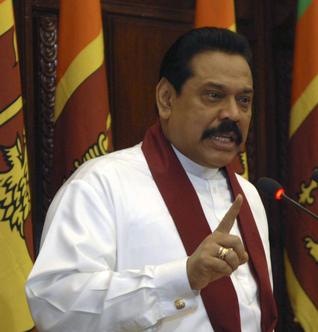 Sri Lanka President Mahinda Rajapaksa has taken exception to the intention of the UN Secretary General Ban Ki-moon to appoint a panel of experts to advise him (the SG) on Sri Lanka and said the move is totally uncalled for and unwarranted.
Sri Lanka President Mahinda Rajapaksa has taken exception to the intention of the UN Secretary General Ban Ki-moon to appoint a panel of experts to advise him (the SG) on Sri Lanka and said the move is totally uncalled for and unwarranted.
On February 26, the spokesperson of Mr. Ban Ki-Moon had disclosed at a news conference in New York that the Secretary General had informed Mr. Rajapaksa in the course of a telephone conversation about his intention to go ahead with the establishment of a panel of experts. Mr. Bank Ki-Moon’s spokesperson had said such a panel would advise him — meaning the Secretary-General, going forward, on accountability issues relating to Sri Lanka.
Various functionaries in the UN since the military defeat of the Liberation Tigers of Tamil Eelam (LTTE) in May have been issuing statements from time to time on the need for a committee or a body to investigate alleged human rights violations in the 34 month long Eelam War IV. Colombo has categorically rejected this and repeatedly pointed to the resolution by the Human Rights Commission lauding Sri Lanka on the military defeat of the Tigers.
A statement by the Secretariat here on Saturday said that in a telephone conversation between the President and the UN Secretary General on Friday, following a letter written by the UNSG on February 25, President Rajapaksa conveyed categorically to Mr. Ban Ki-Moon the proposal to appoint a panel of experts on Sri Lanka was both unprecedented and unwarranted.
It quoted Mr. Rajapaksa as saying that no such action had been taken about other states with continuing armed conflicts on a large scale, involving major humanitarian catastrophes and causing the deaths of a large numbers of civilians due to military action.
“The UNSG was told that Sri Lanka had concluded its armed conflict with the most ruthless terrorist organisation in the world, more than nine months ago, and was in the process of working towards further strengthening of national reconciliation.
“The President also said the implementation of such an intention would certainly be perceived as an interference with the current general election campaign being held island wide; where the people of the North and of the East who were not free to participate in such elections earlier were being given the opportunity to do so, respecting the highest standards of democracy.”
The statement quoted Mr. Rajapaksa as telling Mr. Ban Ki-Moon how interested forces attempted such interference, including by trying to draw in the UN and other bodies, in the recently concluded presidential election, which has been internationally accepted as being peaceful, free and fair.
The statement said the UNSG was told that the allegations about Sri Lanka were motivated misrepresentations by apologists of the LTTE and some Non-Government Organisations that due to being so misguided or otherwise, were clearly working on agenda that was directed against Sri Lanka. There are also sections of the western world being increasingly subjected to electoral pressure by the same apologists of the LTTE, it said.
The President informed the UNSG that he had already, as a further measure of reconciliation, appointed a special committee to study and report on the lessons from the conflict situation that prevailed in some parts of Sri Lanka. The statement quoted Mr. Rajapaksa as telling Mr. Ban Ki-Moon that a panel of eminent persons already working on the allegations of human rights violations and other charges reported by the U.S. State Department, as well as the action by UN Rapporteur Philip Alston on the much disputed Channel 4 video on Sri Lanka.
“President Rajapaksa reiterated to the UNSG that any appointment of such a panel as intended, would compel Sri Lanka to take necessary and appropriate action in that regard. The President stressed that Sri Lanka looked forward to treatment as per the United Nations Charter that provides for equal treatment to all Members of the United Nations, while respecting the principle of non-interference in the internal affairs of states.
(For updates you can share with your friends, follow TNN on Facebook and Twitter )
